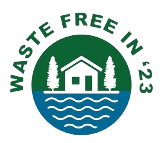Waste Free in 23 summary for EWB Energy and Waste management

Waste Free in 23 (WF23) is an initiative started in Kibera slums of Nairobi Kenya in January 2023 by dedicated community members..
The team were collecting waste from 4,000 households in the Kibera slums and sold the plastic PET bottles and food waste for pig feed and composting. The vast majority of the waste was left at their local dump where the county would occasionally collect and dump it the city landfill – Dandora.
This system is not unique – and is likely typical for 20% of the worlds population.
In desperation the team created WF23 where ALL plastics are recycled, ALL organic wastes are recycled, Disposable Diapers are recycled..
As of May 1, 2023 they have increased their collections from 4,000 to 6,000 households and NO waste is being dumped or burned. ALL is being upcycled, recycled or processed.
Their solution is that all the waste from the community is processed by the community, in the community, for the benefit of the community.
With a strategy to become waste free, they began looking at additional significant problems: Insufficient number and capacity of toilets – no sewer system, gray water dumped in the Nairobi river, expense and pollution of cooking with kerosene and coal, communities that have no electricity need a plastic recycling solution.
They team have solutions for these 4 additional challenges that are in various stages of implementation.
For plastic recycling a heat press is needed to heat a mix of plastics containing polyethylene which at 150c becomes very sticky and bonds all types of plastics, and other materials together. While hot the panel created is very pliable and can be formed into a variety of products: fence posts, trays, bins, chairs, roof panels etc.
For communities without electricity a solar heat press allows this recycling. See below
The solar concentrator system with heat transfer by oil with maximum insulation is also a solution to cooking pollution and cost challenges in both the communities with and without electricity. See below..
8 of the 53 communities working to be waste free also want to transition to the clean communal cooking solution that will reduce their cost to cook by 30%.
We will be deploying and piloting solar powered plastic upcycling heat press in Kakuma refugee camp.


